管理科学专业英语课堂展示
药学专业英语

广东药学院
精品课程、优质课程申报书
课程名称药学专业英语
课程性质□公共必修课□基础必修课
□专业主要课程□其它
申报类型□精品课程□优质课程
课程负责人曾爱华
所属二级学院药科学院(盖章)
所属教研室药学综合教研室
申报日期2009 年 5 月 18 日
广东药学院教务处制
1.课程基本信息及指导思想
说明:1、本申报书各项内容阐述时请注意以事实和数据为依据,各表格不够可加页。
2、申报精品课程必须有课程网站,未被评选为精品课程者自动参与优质课程评选。
2. 师资队伍
3. 课程教学
6. 教学效果
7. 课程特色
8. 课程建设计划。
公共管理学专业英语词汇整理
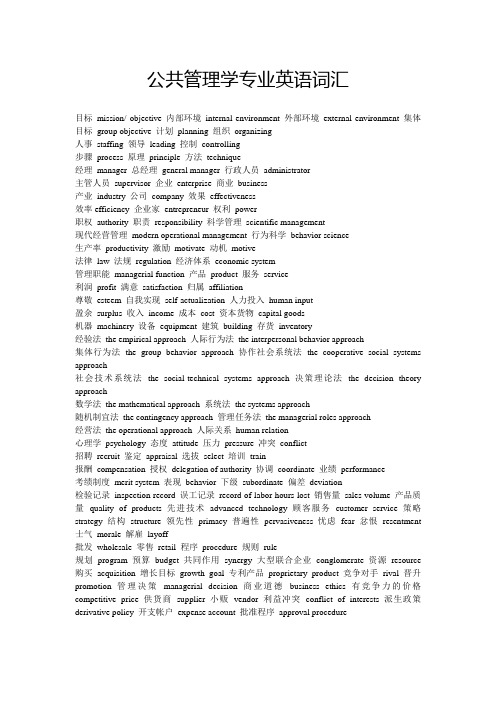
公共管理学专业英语词汇目标mission/ objective 内部环境internal environment 外部环境external environment 集体目标group objective 计划planning 组织organizing人事staffing 领导leading 控制controlling步骤process 原理principle 方法technique经理manager 总经理general manager 行政人员administrator主管人员supervisor 企业enterprise 商业business产业industry 公司company 效果effectiveness效率efficiency 企业家entrepreneur 权利power职权authority 职责responsibility 科学管理scientific management现代经营管理modern operational management 行为科学behavior science生产率productivity 激励motivate 动机motive法律law 法规regulation 经济体系economic system管理职能managerial function 产品product 服务service利润profit 满意satisfaction 归属affiliation尊敬esteem 自我实现self-actualization 人力投入human input盈余surplus 收入income 成本cost 资本货物capital goods机器machinery 设备equipment 建筑building 存货inventory经验法the empirical approach 人际行为法the interpersonal behavior approach集体行为法the group behavior approach 协作社会系统法the cooperative social systems approach社会技术系统法the social-technical systems approach 决策理论法the decision theory approach数学法the mathematical approach 系统法the systems approach随机制宜法the contingency approach 管理任务法the managerial roles approach经营法the operational approach 人际关系human relation心理学psychology 态度attitude 压力pressure 冲突conflict招聘recruit 鉴定appraisal 选拔select 培训train报酬compensation 授权delegation of authority 协调coordinate 业绩performance考绩制度merit system 表现behavior 下级subordinate 偏差deviation检验记录inspection record 误工记录record of labor-hours lost 销售量sales volume 产品质量quality of products 先进技术advanced technology 顾客服务customer service 策略strategy 结构structure 领先性primacy 普遍性pervasiveness 忧虑fear 忿恨resentment 士气morale 解雇layoff批发wholesale 零售retail 程序procedure 规则rule规划program 预算budget 共同作用synergy 大型联合企业conglomerate 资源resource 购买acquisition 增长目标growth goal 专利产品proprietary product 竞争对手rival 晋升promotion 管理决策managerial decision 商业道德business ethics 有竞争力的价格competitive price 供货商supplier 小贩vendor 利益冲突conflict of interests 派生政策derivative policy 开支帐户expense account 批准程序approval procedure病假sick leave 休假vacation 工时labor-hour 机时machine-hour 资本支出capital outlay 现金流量cash flow 工资率wage rate 税收率tax rate 股息dividend 现金状况cash position 资金短缺capital shortage总预算overall budget 资产负债表balance sheet 可行性feasibility投入原则the commitment principle 投资回报return on investment 生产能力capacity to produce 实际工作者practitioner 最终结果end result 业绩performance个人利益personal interest 福利welfare 市场占有率market share 创新innovation 生产率productivity 利润率profitability社会责任public responsibility 董事会board of director 组织规模size of the organization 组织文化organizational culture 目标管理management by objectives 评价工具appraisal tool 激励方法motivational techniques 控制手段control device 个人价值personal worth 优势strength 弱点weakness 机会opportunity 威胁threat个人责任personal responsibility 顾问counselor 定量目标quantitative objective 定性目标qualitative objective 可考核目标verifiable objective 优先priority 工资表payroll 策略strategy 政策policy 灵活性discretion 多种经营diversification 评估assessment 一致性consistency应变策略consistency strategy 公共关系public relation 价值value 抱负aspiration 偏见prejudice 审查review 批准approval 主要决定major decision 分公司总经理division general manager 资产组合距阵portfolio matrix 明星star 问号question mark 现金牛cash cow 赖狗dog 采购procurement 人口因素demographic factor 地理因素geographic factor 公司形象company image产品系列product line 合资企业joint venture 破产政策liquidation strategy紧缩政策retrenchment strategy 战术tactics 追随followership个性individuality 性格personality 安全safety 自主权latitude 悲观的pessimistic 静止的static 乐观的optimistic 动态的dynamic 灵活的flexible 抵制resistance 敌对antagonism 折中eclectic 激励motivation 潜意识subconscious 地位status 情感affection 欲望desire 压力pressure满足satisfaction自我实现的需要needs for self-actualization 尊敬的需要esteem needs 归属的需要affiliation needs 安全的需要security needs 生理的需要physiological needs 维持maintenance 保健hygiene 激励因素motivator 概率probability 强化理论reinforcement theory 反馈feedback 奖金bonus 股票期权stock option 劳资纠纷labor dispute 缺勤率absenteeism 人员流动turnover 奖励reward 特许经营franchise 热诚zeal 信心confidence 鼓舞inspire 要素ingredient忠诚loyalty 奉献devotion 作风style 品质trait适应性adaptability 进取性aggressiveness 热情enthusiasm毅力persistence 人际交往能力interpersonal skills行政管理能力administrative ability智力intelligence 专制式领导autocratic leader 民主式领导democratic leader 自由放任式领导free-rein leader 管理方格图the managerial grid 工作效率work efficiency 服从obedience 领导行为leader behavior支持型领导supportive leadership 参与型领导participative leadership指导型领导instrumental leadership成就取向型领导achievement-oriented leadershipAutomated inspection 自动化检验automatic assembly system 自动化装配系统applied biomechanics 应用生物力学CAD/CAM 计算机辅助设计与制造computer integrated manufacturing system 计算机整合制造系统data structure 数据结构data base management system 数据库管理系统decision analysis 决策分析engineering economy 工程经济engineering statistics 工程统计facilities planning 设施规划factory diagnoisis and improvement method 工厂诊断与改善方法financial and cost analysis 财务与成本分析fuzzy theory and application 模糊理论与应用human-computer interaction (HCI)人因工程与计算机系统human factors engineering 人因工程human information processing 人类讯息处理human-machine system design 人机系统设计human resource management 人力资源管理human system diagnosis and improvement 人体系统诊断与改善industrial environment evaluation 工业环境评估industrial organizations and management 工业组织与管理industrial safety 工业安全information technology 信息技术intellectual property laws 智慧财产权法knowledge engineering 知识工程linear algebra 线性代数manufacturing automation 制造自动化manufacturing engineering 制造工程manufacturing management 制造管理manufacturing process 制造程序manufacturing systems and management 制造系统与管理market and marketing 市场与行销material flows automation 物流自动化mathematical programming 数学规划multicriteria decision making 多目标规划multi-criteria decision methods 多准则决策分析network analysis 网络分析numerical analysis 数值分析organization and management 组织与管理product and technology development management 产品与技术开发管理production management 生产管理production planning and control 生产计划与管制quality control 质量管理quality engineering 品质工程quality management techniques and practice 品质管理queueing theory 等候线理论reliability engineering 可靠度工程research,development and innovation management 研究发展管理semiconductor production management 半导体生产管理sequencing and scheduling 排序与排程simulation 模拟分析statistical method 统计方法stochastic processes 随机系统strategic management of technology 技术策略system analysis and design in large scale 大型系统分析与设计system performance evaluation 系统绩效评估技术system quality assurance engineering 系统品质保证工程systems engineering 系统工程systems simulation 系统仿真vision and colors 视觉与色彩work physiology 工作生理学work study 工作研究Accounting Assistant 会计助理Accounting Clerk 记帐员Accounting Manager 会计部经理Accounting Stall 会计部职员Accounting Supervisor 会计主管Administration Manager 行政经理Administration Staff 行政人员Administrative Assistant 行政助理Administrative Clerk 行政办事员Advertising Staff 广告工作人员Airlines Sales Representative 航空公司定座员Airlines Staff 航空公司职员Application Engineer 应用工程师Assistant Manager 副经理Bond Analyst 证券分析员Bond Trader 证券交易员Business Controller 业务主任Business Manager 业务经理Buyer 采购员Cashier 出纳员Chemical Engineer 化学工程师Civil Engineer 土木工程师Clerk/Receptionist 职员/接待员Clerk Typist & Secretary 文书打字兼秘书Computer Data Input Operator 计算机资料输入员Computer Engineer 计算机工程师Computer Processing Operator 计算机处理操作员Computer System Manager 计算机系统部经理Copywriter 广告文字撰稿人Deputy General Manager 副总经理Economic Research Assistant 经济研究助理Electrical Engineer 电气工程师Engineering Technician 工程技术员English Instructor/Teacher 英语教师Export Sales Manager 外销部经理Export Sales Staff 外销部职员Financial Controller 财务主任Financial Reporter 财务报告人F.X. (Foreign Exchange)Clerk 外汇部职员F.X. Settlement Clerk 外汇部核算员Fund Manager 财务经理General Auditor 审计长General Manager/ President 总经理General Manager Assistant 总经理助理General Manager's Secretary 总经理秘书Hardware Engineer 计算机硬件工程师Import Liaison Staff 进口联络员Import Manager 进口部经理Insurance Actuary 保险公司理赔员International Sales Staff 国际销售员Interpreter 口语翻译Legal Adviser 法律顾问Line Supervisor 生产线主管Maintenance Engineer 维修工程师Management Consultant 管理顾问Manager 经理Manager for Public Relations 公关部经理Manufacturing Engineer 制造工程师Manufacturing Worker 生产员工Market Analyst 市场分析员Market Development Manager 市场开发部经理Marketing Manager 市场销售部经理Marketing Staff 市场销售员Marketing Assistant 销售助理Marketing Executive 销售主管Marketing Representative 销售代表Marketing Representative Manager 市场调研部经理Mechanical Engineer 机械工程师Mining Engineer 采矿工程师Music Teacher 音乐教师Naval Architect 造船工程师Office Assistant 办公室助理Office Clerk 职员Operational Manager 业务经理Package Designer 包装设计师Passenger Reservation Staff 乘客票位预订员Personnel Clerk 人事部职员Personnel Manager 人事部经理Plant/ Factory Manager 厂长Postal Clerk 邮政人员Private Secretary 私人秘书Product Manager 生产部经理Production Engineer 产品工程师Professional Staff 专业人员Programmer 电脑程序设计师Project Staff 项目策划人员Promotional Manager 推售部经理Proof-reader 校对员Purchasing Agent 采购进货员Quality Control Engineer 质量管理工程师Real Estate Staff 房地产职员Recruitment Co-ordinator 招聘协调人Regional Manger 地区经理Research&.Development Engineer 研究开发工程师Restaurant Manager 饭店经理Sales and Planning Staff 销售计划员Sales Assistant 销售助理Sales Clerk 店员、售货员Sales Coordinator 销售协调人Sales Engineer 销售工程师Sales Executive 销售主管Sales Manager 销售部经理Salesperson 销售员Seller Representative 销售代表Sales Supervisor 销售监管School Registrar 学校注册主任Secretarial Assistant 秘书助理Secretary 秘书Securities Custody Clerk 保安人员Security Officer 安全人员Senior Accountant 高级会计Senior Consultant/Adviser 高级顾问Senior Employee 高级雇员Senior Secretary 高级秘书Service Manager 服务部经理Simultaneous Interpreter 同声传译员Software Engineer 计算机软件工程师Supervisor 监管员Systems Adviser 系统顾问Systems Engineer 系统工程师Systems Operator 系统操作员Technical Editor 技术编辑Technical Translator 技术翻译Technical Worker 技术工人Telecommunication Executive电讯(电信)员Telephonist / Operator 电话接线员、话务员Tourist Guide 导游Trade Finance Executive 贸易财务主管Trainee Manager 培训部经理Translation Checker 翻译核对员Translator 翻译员Trust Banking Executive 银行高级职员Typist 打字员Wordprocessor Operator 文字处理操作员Aaccess discrimination 进入歧视action research 动作研究adjourning 解散adhocracy 特别结构administrative principle 管理原则artifacts 人工环境artificial intelligence 人工智能工巧匠avoiding learning 规避性学习ambidextrous approach 双管齐下策略Bbalance sheet 资产负债表bcg matrix 波士顿咨询集团矩阵bona fide occupation qualifications 善意职业资格审查bounded rationality 有限理性bureaucracy 官僚机构benchmarking 标杆瞄准bounded rationality perspective 有限理性方法boundary-spanning roles 跨超边界作用Ccomputer-aided design and computer-automated manufacturing(cad/cam) 计算机辅助设计与计算机自动生产confrontation 对话consortia 企业联合change agent 变革促进者chaos theory 混沌理论charismatic leaders 魅力型领导者charity principle 博爱原则coercive power 强制权cohesiveness 凝聚力collaborative management 合作型管理comparable worth 可比较价值competitive benchmarking 竞争性基准confrontation meeting 碰头会constancy of purpose 永久性目标contingency approach 权变理论corporate social performance 公司社会表现corporate social responsibility公司社会责任corporate social responsiveness公司社会反应critical incident 关键事件current assets 流动资产current liabilities 流动负债culture strength 文化强度creative department 创造性部门craft technology 技艺性技术contextual dimension 关联性维度continuous process production 连续加工生产collectivity stage 集体化阶段clan control 小团体控制clan culture 小团体文化coalition 联合团体collaborative 协作网络centrality 集中性centraliazation 集权化charismatic authority 竭尽忠诚的权力Ddecentralization 分权democracy management 民主管理departmentalization 部门化differential rate system 差别报酬系统dialectical inquiry methods 辩证探求法division of labor 劳动分工downward mobility 降职流动dynamic engagement 动态融合dynamic network 动态网络domain 领域direct interlock 直接交叉divisional form 事业部模式differentiation strategy 差别化战略decision premise 决策前提dual-core approach 二元核心模式Eelectronic data-processing(edp) 电子数据处理employee-oriented style 员工导向型风格empowerment 授权encoding 解码end-user computing 终端用户计算系统entrepreneurship 企业家精神equity 净资产equity theory 公平理论espoused value 信仰价值ethnocentric manager 种族主义的管理者expectancy theory 期望理论expense budget 支出预算expense center 费用中心external audit 外部审计external stakeholders 外部利益相关者extrinsic rewards 外部奖励ethic ombudsperson 伦理巡视官external adaption 外部适应性elaboration stage 精细阶段entrepreneurial stage 创业阶段escalating commitment 顽固认同Ffamily group 家庭集团financial statement 财务报表flat hierarchies 扁平型结构flexible budget 弹性预算force-field theory 场力理论formal authority 合法权力formal systematic appraisal 正式的系统评估franchise 特许经营权formalization stage 规范化阶段functional grouping 职能组合formal channel of communication 正式沟通渠道Ggame theory 博弈论general financial condition 一般财务状况geocentric manager 全球化管理者general manager 总经理globalization 全球化gossip chain 传言链grapevine 传言网global strategic partnership 全球战略伙伴关系general environment 一般环境generalist 全面战略geographic grouping 区域组合global company 全球公司global geographic structure 全球区域结构Hhawthorne effect 霍桑效应heuristic principles 启发性原理hierarchy 科层制度hiring specification 招聘细则horizontal linkage model 横向联系模型hybrid structure 混合结构high tech 高接触high-velocity environments 高倍速环境Iimpoverished management 放任式管理income statement 损益表information transformation 信息转换infrastructure 基础设施integrative process 整合过程intelligent enterprises 智力企业internal audit 内部审计internal stakeholder 内部相关者internship 实习intrapreneurship 内部企业家精神intrinsic reward 内在报酬inventory 库存, 存货internal integration 内部整合interorganization relationship 组织间的关系intergroup conflict 团体间冲突interlocking directorate 交叉董事会institutional perspective 机构的观点intuitive decision making 直觉决策idea champion 构思倡导者incremental change 渐进式变革informal organizational structure 非正式组织结构informal performance appraisal 非正式业绩评价Jjob description 职务描述job design 职务设计job enlargement 职务扩大化job enrichment 职务丰富化job rotation 职务轮换job specialization 职务专业化Kkey performance areas 关键业务区key result areas 关键绩效区Llabor productivity index 劳动生产力指数laissez management 自由化管理large batch production 大批量生产lateral communication 横向沟通leadership style 领导风格least preferred co-worker(lpc)最不喜欢的同事legitimate power 合法权力liability 负债liaison 联络者line authority 直线职权liquidity 流动性liaison role 联络员角色long-linked technology 纵向关联技术losses from conflict 冲突带来的损失low-cost leadership 低成本领先Mmanagement by objective 目标管理Managerial Grid 管理方格matrix bosses 矩阵主管management champion 管理倡导者materials-requirements planning(MRP) 物料需求计划Mslow,s hierarchy of needs 马斯洛需求层次论marketing argument 管理文化多元化营销观multiculturalism 文化多元主义multidivisional firm 多部门公司moral rules 道德准则management by walking around(MBW A) 走动式管理matrix structure 矩阵结构multinational enterprise(MNE) 跨国公司moral relativism 道德相对主义mechanistic system 机械式组织middle-of-the-road management 中庸式管理meso theory 常态理论multidomestic strategy 多国化战略mediating technology 调停技术Nna?ve relativism 朴素相对主义need-achievement 成就需要norming 规范化norms 规范nonprogrammed decisions 非程序化决策nonsubstitutability 非替代性nonroutine technology 非例行技术niche 领地Ooff-the-job training 脱产培训on-the-job training 在职培训operational budget 运营预算order backlog 订单储备organic system 有机系统organizational development(OD) 组织发展orientation 定位outcome interdependence 结果的相互依赖性outplacement services 外延服务organization ecosystem 组织生态系统Pparadox of authority 权威的矛盾paradox of creativity 创造力的矛盾paradox of disclosure 开放的矛盾paradox of identify 身份的矛盾paradox of individuality 个性的矛盾paradox of regression 回归的矛盾partial productivity 部分生产率participative management 参与式管理path-goal model 路径目标模型peer recruiter 同级招聘political action committees(PACs) 政治活动委员会polycentric manager 多中心管理者portfolio framework 业务组合框架portfolio investment 资产组合投资positive reinforcement 正强化production flexibility 生产柔性profitability 收益率programmed decisions 程序化决策psychoanalytic view 精神分析法paradigm 范式personal ratios 人员比例pooled dependence 集合性依存professional bureaucracy 专业官僚机构problem identification 问题识别problemistic search 问题搜寻population ecology model 种群生态模型Qquality 质量quality circle 质量圈question mark 问题类市场quid pro quo 交换物Rrational model of decision making 理性决策模式realistic job preview(RJP) 实际工作预览reciprocal interdependence 相互依存性resource dependence 资源依赖理论routine technology 例行技术retention 保留rational approach 理性方法rational model 理性模型rational-legal authority 理性—合法权威Ssemivariable cost 准可变成本sense of potency 力量感sensitivity training 敏感性训练sexual harassment 性骚扰short-run capacity changes 短期生产能力变化single-strand chain 单向传言链situational approach 情境方法situational force 情境力量situational leadership theory 情境领导理论sliding-scale budget 移动规模预算small-batch production 小规模生产sociotechnical approaches 社会科技方法span of management 管理幅度staff authority 参谋职权standing plan 长设计划step budget 分步预算stewardship principle 管家原则stimulus 刺激storming 调整阶段strategic management 战略管理strategic partnering 战略伙伴关系strategy formulation 战略制定strategy implementation 战略实施strategic control 战略控制strategic contingencies 战略权变satisficing 满意度subsystems 子系统subunits 子单位synergy 协同system boundary 系统边界structure dimension 结构性维度sequential interdependence 序列性依存self-directed team 自我管理型团队specialist 专门战略strategy and structure changes 战略与结构变革symptoms of structural deficiency 结构无效的特征Ttall hierarchies 高长型科层结构task force or project team 任务小组或项目团队task independence 任务的内部依赖性task management 任务型管理task-oriented style 任务导向型管理风格total productivity 全部生产率Total Quality Management 全面质量管理training positions 挂职培训training program 培训程序transactional leaders 交易型领导transformational leaders 变革型领导treatment discrimination 歧视待遇two-factory theory 双因素理论two-boss employees 双重主管员工technical or product champion 技术或产品的倡导者Uunfreezing 解冻unit production 单位产品Vvariation 变种子variety 变量valence 效价variable costs 可变成本vertical communication 纵向沟通vertical integration 纵向一体化vestibule training 仿真培训volume flexibility 产量的可伸缩性vertical linkage 纵向连接venture team 风险团队value based leadership 基于价值的领导Wwin-lose situation 输赢情境win-win situation 双赢情境workforce literacy 员工的读写能力work in progress 在制品work flow redesign 工作流程再造成work flow automation 工作流程自动化whistle blowing 揭发Zzero-sum 零---和zone of indifference(area of acceptance) 无差异区域(可接受区域)。
北京交通大学管理科学李学伟、刘世峰现代决策理论与应用考博参考书-考博分数线-专业课真题

北京交通大学管理科学李学伟、刘世峰现代决策理论与应用考博参考书-考博分数线-专业课真题一、专业的设置北京交通大学经济管理学院每年招收博士生54人,下设应用经济学、安全科学与工程、管理科学、物流管理与工程、信息管理、工程与项目管理、会计学、企业管理、旅游管理、技术经济及管理,共10个专业。
管理科学专业下设2个方向,分别是①服务科学理论与信息化应用,导师有关忠良、张真继、李学伟、刘世峰、苟娟琼、高自友、王庆云、陈喜庆;②现代决策理论与应用,导师有关忠良、李学伟、刘世峰、王庆云、陈喜庆、周静、郑吉春、王岳森。
二、考试的科目管理科学的考试科目为:①1101英语②2215管理运筹学③3337管理工程基础理论三、导师介绍关忠良,男,锡伯族,1964年5月出生,辽宁开原人。
北方交通大学研究生毕业,经济学博士,教授,博士生导师。
曾任北京交通大学党委常委,副校长。
现任大庆市委常委,市人民政府副市长、党组成员。
李学伟:大连交通大学党委委员、常委、副书记,校长。
男,汉族,中共党员,理学博士,教授,管理科学与工程学科博士生导师。
刘世峰,产业经济学博士,注册资产评估师,九三学社社员。
北京交通大学经管学院信息管理系教师。
目前主要从事信息管理与信息系统本科专业教学科研;企业管理、管理工程与科学专业硕士研究生培养及科研工作。
育明教育考博分校,专注北京交通大学考博专业课辅导陈喜庆,男,汉族,1956年4月出生,山东惠民人。
1975年5月参加工作,1983年6月加入中国共产党。
在职研究生学历,管理学博士学位。
现任中共中央统战部副部长。
郑吉春,男,1961年7月出生,满族,黑龙江省海伦市,中共党员,北京交通大学管理科学与工程专业研究生毕业,管理学博士,研究员,高级工程师,北京交通大学兼职教授、博士生导师。
现任北京工业大学党委书记,主持学校党委全面工作,暂时主持学校行政工作。
四、参考书目考试科目参考书目1101英语全国公共英语等级考试(PETS)4、5级参考书,不限定出版社2215管理运筹学《管理运筹学》,中国铁道出版社,2000年,张文杰;《运筹学(第4版)》,清华大学出版社,2012年,《运筹学》教材编写组3337管理工程基础理论《管理学(第7版)》,中国人民大学出版社,[美]斯蒂芬.P.罗宾斯五、北京交通大学考博英语北交大的考博英语满分100分,题型有词汇、完型、阅读、翻译和写作等。
能力本位课堂教学模式在专业英语课中的探索
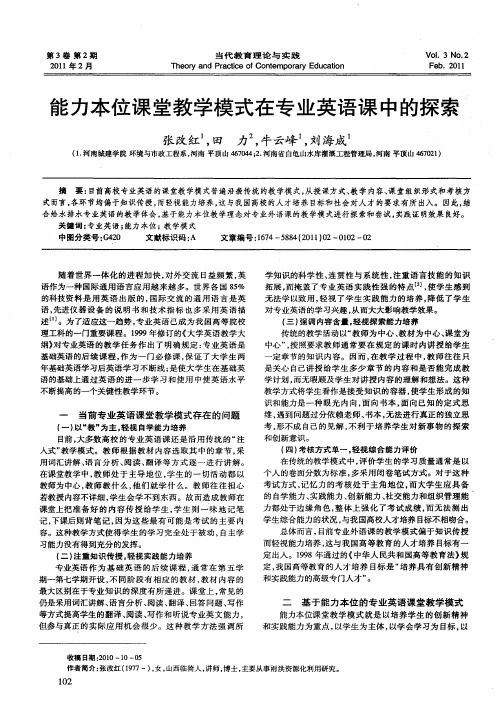
习能力没有得到充分 的发挥。
( ) 重知 识 传 授 , 视 实 践 能 力培 养 二 注 轻
专业英语 作 为基 础 英 语 的后 续 课程 , 常在 第 五学 通 期—第七学期开设 , 同阶段 有相 应 的教材 , 材 内容 的 不 教
入式 ” 教学模 式。教 师根据 教材 内容 选取其 中的章节 , 采 用词汇讲解 、 语言 分析 、 阅读 、 翻译 等方 式逐 一进行 讲 解。 在课堂教学 中 , 师处 于主 导地位 , 生 的一切 活动都 以 教 学 教师为 中心 , 教师 教什 么 , 他们 就学 什么 。教 师往 往担 心 若教授 内容不详细 , 学生会 学不到东 西。故而造成 教师在 课堂上把准 备好 的 内容 传 授 给学 生 , 学生 则 一 味地 记 笔 记, 下课后则背 笔记 , 因为这 些最 有可 能是考 试 的主要 内 容 。这种教学方式使 得学生 的学 习完 全处于被 动 , 自主学
第 3卷 第 2期 2 1 年 2月 01
当 代 教 育 理 论 与 实 践
Th or n r c ie o n e e y a d P a t fCo t mp r r d c t n c o ay E u a i o
V 1 . o .3 No 2
F b 0 1 e .2 1
和 创 新 意识 。 ( ) 核 方 式 单 一 , 视 综 合 能 力评 价 四 考 轻 在传统 的教学模式 中 , 评价 学生 的学 习质量通 常是 以
当前专 业英 语课 堂教 学模式存 在 的问题
( ) “ ” 主 。 视 自学 能 力 培 养 一 以 教 为 轻 目前 , 大多数高校 的专 业英 语课 还是沿 用传 统的 “ 注
个人的卷面分数为标 准 , 多采用 闭卷笔试方式 。对 于这种 考试方式 , 忆力 的考 核处 于主 角地位 , 记 而大学生 应具 备 的 自学能力 、 实践 能力 、 新能力 、 创 社交能力 和组 织管理能
各专业英语

各专业英语专业名称学制招生类别英文名称数学与应用数学(S) 4 理工Mathematics and Applied Mathematics(normal)物理学(S)4 理工Physics(normal) 地理科学(S)4 理工Geography(normal)资源环境与城乡规划管理2 理工Urban and Rural Planning & Resource management生物科学(S)4 理工Biological Science(normal) 生物技术 4 理工Biotechnology园林4 理工Landscape gardening 汉语言文学(S)4 文史Chinese Philology(normal)汉语言文学4 文史Chinese Philology 历史学(S)4 文史Historical(normal)思想政治教育(S)4 文史Idea logical & Political 法学4 文史Law Science会计学 4 文理Accounting 工商管理 4 文理Business Administration国际经济与贸易4 文理International Economic and Trade 市场营销4 文理Marketing物流管理4 文理Logistic Management 英语4 文理English英语(S)4 文理English(normal) 游管理4 文理Management of Tourism日语4 文理Japanese 俄语(零起点)4 文理Russian(from the very beginning)俄语 4 文理Russian 音乐学(S) 4 艺术(文理)Musicology(normal)音乐表演4 艺术(文理)Music Performance 美术学(S)4 艺术(文理)Fine Arts(normal) 绘画4 艺术(文理)Painting 艺术设计4 艺术(文理)Artistic Designing体育教育(S)4 体育(理)Physical Education(normal)社会体育4 体育(理)Sociological Science of Sports材料成型及控制工程(模具与铸造)4 理工Material formation and control engineering()焊接技术与工程4 理工Welding Technology and Engineering 金属材料工程4 理工Metallic Materials Engineering无机非金属材料工程4 理工Inorganic Nonmetallic Materials Engineering机械设计制造及其自动化4 理工Machine Design & Manufacturing and Automation农业机械化及其自动化 4 理工Agricultural mechanization and automation包装工程4 理工Packaging Engineering热能与动力工程4 理工Thermal Energy and Power Engineering 交通运输4 理工Traffic and Transportation工业设计4 理工Industrial Design农业电气化与自动化4 理工Agricultural Electrification and Automation计算机科学与技术 4 理工Computer Science and Technology 电气工程及其自动化 4 理工Electrical Engineering and Automation自动化4 理工Automation 电子信息工程 4 理工Electronic and Information Engineering 通信工程 4 理工Communication Engineering 生物医学工程4 理工Bioengineering临床医学5 理工Clinical Medicine 预防医学4 理工preventive medicine化学(S)4 理工Chemistry(normal) 药学 4 理工Pharmacy制药工程4 理工Pharmacy Engineering 医药营销3 理工文秘2 文史Secretary 物业管理2 文理Property Management机动车检测与维修 2 理工电子信息工程技术 2 理工Electronic and Information Engineering and technology电子商务2 文理Electronic Commerce计算机应用技术(建龙定向班)2 理工Computer applied technique医学检验(临床检验学)5 理工Medical Laboratory Tests and Analyses医学检验(临床输血学)5 理工Medical Laboratory Tests and Analyses口腔医学5 理工Oral Medicine 口腔修复工艺学4 理工Mouth cavity repair护理学4 理工Nursing 康复治疗学 4 理工rehabilitation学前教育(S)4 艺术文Preschool Education(normal)教育技术学(s)4 理工Educational T echnology(normal)土木工程4 理工Civil Engineering 建筑学4 理工Architecture工商管理(企业管理方向投资理财方向市场营销实务方向)4 文理Business Administration会计学(会计学方向注册会计师方向公司理财方向)4 文理Accounting国际经济与贸易(国际经济与金融方向国际经济与贸易实务方向)4 文理International Economic and Trade计算机科学与技术(软件方向信息管理方向)4 理工Computer Science and Technology汉语言文学(S)(小学教育方向)4 文史Chinese Philology(normal)数学与应用数学(S)(小学教育方向)4 理工Mathematics and Applied Mathematics(normal) 法律事务2 文理安全保卫(网络信息安全) 2 文理哲学Philosophy哲学Philosophy马克思主义哲学Philosophy of Marxism中国哲学Chinese Philosophy外国哲学Foreign Philosophies逻辑学Logic伦理学Ethics美学Aesthetics宗教学Science of Religion科学技术哲学Philosophy of Science and Technology经济学Economics理论经济学Theoretical Economics政治经济学Political Economy经济思想史History of Economic Thought经济史History of Economic西方经济学Western Economics世界经济World Economics人口、资源与环境经济学Population, Resources and Environmental Economics应用经济学Applied Economics国民经济学National Economics区域经济学Regional Economics财政学(含税收学)Public Finance (including Taxation)金融学(含保险学)Finance (including Insurance)产业经济学Industrial Economics国际贸易学International Trade劳动经济学Labor Economics统计学Statistics数量经济学Quantitative Economics中文学科、专业名称英文学科、专业名称国防经济学National Defense Economics法学Law法学Science of Law法学理论Jurisprudence法律史Legal History宪法学与行政法学Constitutional Law and Administrative Law 刑法学Criminal Jurisprudence民商法学(含劳动法学、社会保障法学) Civil Law and Commercial Law (including Science of Labour Law and Science of Social Security Law )诉讼法学Science of Procedure Laws经济法学Science of Economic Law环境与资源保护法学Science of Environment and Natural Resources Protection Law国际法学(含国际公法学、国际私法学、国际经济法学、) International law (including International Public law, International Private Law and International Economic Law)军事法学Science of Military Law政治学Political Science政治学理论Political Theory中外政治制度Chinese and Foreign Political Institution科学社会主义与国际共产主义运动Scientific Socialism and InternationalCommunist Movement中*史(含党的学说与党的建设) History of the Communist Party of China(including the Doctrine of China Party and Party Building)马克思主义理论与思想政治教育Education of Marxist Theory and Education in Ideology and Politics国际政治学International Politics国际关系学International Relations外交学Diplomacy社会学Sociology社会学Sociology人口学Demography人类学Anthropology民俗学(含中国民间文学) Folklore (including Chinese Folk Literature)民族学Ethnology民族学Ethnology马克思主义民族理论与政策Marxist Ethnic Theory and Policy 中国少数民族经济Chinese Ethnic Economics中国少数民族史Chinese Ethnic History中国少数民族艺术Chinese Ethnic Art教育学Education教育学Education Science教育学原理Educational Principle课程与教学论Curriculum and Teaching Methodology教育史History of Education比较教育学Comparative Education学前教育学Pre-school Education高等教育学Higher Education成人教育学Adult Education职业技术教育学V ocational and Technical Education特殊教育学Special Education教育技术学Education Technology心理学Psychology基础心理学Basic Psychology发展与心理学Developmental and Educational Psychology应用心理学Applied Psychology体育学Science of Physical Culture and Sports体育人文社会学Humane and Sociological Science of Sports 运动人体科学Human Movement Science体育教育训练学Theory of Sports Pedagogy and Training民族传统体育学Science of Ethnic Traditional Sports文学Literature中国语言文学Chinese Literature文艺学Theory of Literature and Art语言学及应用语言学Linguistics and Applied Linguistics汉语言文字学Chinese Philology中国古典文献学Study of Chinese Classical Text中国古代文学Ancient Chinese Literature中国现当代文学Modern and Contemporary Chinese Literature中国少数民族语言文学Chinese Ethnic Language and Literature比较文学与世界文学Comparative Literature and World Literature 外国语言文学Foreign Languages and Literatures 英语语言文学English Language and Literature俄语语言文学Russian Language and Literature法语语言文学French Language and Literature德语语言文学German Language and Literature日语语言文学Japanese Language and Literature印度语言文学Indian Language and Literature西班牙语语言文学Spanish Language and Literature阿拉伯语语言文学Arabic Language and Literature欧洲语言文学European Language and Literature亚非语言文学Asian-African Language and Literature外国语言学及应用语言学Linguistics and Applied Linguistics in Foreign Languages新闻传播学Journalism and Communication新闻学Journalism传播学Communication艺术学Art艺术学Art Theory音乐学Music美术学Fine Arts设计艺术学Artistic Design戏剧戏曲学Theater and Chinese Traditional Opera电影学Film广播电视艺术学Radio and television Art舞蹈学Dance历史学History历史学History史学理论及史学史Historical Theories and History of Historical Science考古学及博物馆学Archaeology and Museology历史地理学Historical Geography历史文献学(含敦煌学、古文字学) Studies of Historical Literature (including Paleography and Studies of Dunhuang) 专门史History of Particular Subjects中国古代史Ancient Chinese History中国近现代史Modern and Contemporary Chinese History世界史World History理学Natural Science数学Mathematics基础数学Fundamental Mathematics计算数学Computational Mathematics概率论与数理统计Probability and Mathematical Statistics应用数学Applied mathematics运筹学与控制论Operational Research and Cybernetics物理学Physics理论物理Theoretical Physics粒子物理与原子核物理Particle Physics and Nuclear Physics原子与分子物理Atomic and Molecular Physics等离子体物理Plasma Physics凝聚态物理Condensed Matter Physics声学Acoustics光学Optics无线电物理Radio Physics化学Chemistry无机化学Inorganic Chemistry分析化学Analytical Chemistry有机化学Organic Chemistry物理化学(含化学物理)Physical Chemistry (including Chemical Physics)高分子化学与物理Chemistry and Physics of Polymers天文学Astronomy天体物理Astrophysics天体测量与天体力学Astrometry and Celestial Mechanics地理学Geography自然地理学Physical Geography人文地理学Human Geography地图学与地理信息系统Cartography and Geography Information System大气科学Atmospheric Sciences气象学Meteorology大气物理学与大气环境Atmospheric Physics and Atmospheric Environment 海洋科学Marine Sciences物理海洋学Physical Oceanography海洋化学Marine Chemistry海洋生理学Marine Biology海洋地质学Marine Geology地球物理学Geophysics固体地球物理学Solid Earth Physics空间物理学Space Physics地质学Geology矿物学、岩石学、矿床学Mineralogy, Petrology, Mineral Deposit Geology 地球化学Geochemistry古生物学与地层学(含古人类学)Paleontology and Stratigraphy (including Paleoanthropology)构造地质学Structural Geology第四纪地质学Quaternary Geology生物学Biology植物学Botany动物学Zoology生理学Physiology水生生物学Hydrobiology微生物学Microbiology神经生物学Neurobiology遗传学Genetics发育生物学Developmental Biology细胞生物学Cell Biology生物化学与分子生物学Biochemistry and Molecular Biology生物物理学Biophysics生态学Ecology系统科学Systems Science系统理论Systems Theory系统分析与集成Systems Analysis and Integration科学技术史History of Science and Technology工学Engineering力学Mechanics一般力学与力学基础General and Fundamental Mechanics固体力学Solid Mechanics流体力学Fluid Mechanics工程力学Engineering Mechanics机械工程Mechanical Engineering机械制造及其自动化Mechanical Manufacture and Automation机械电子工程Mechatronic Engineering机械设计与理论Mechanical Design and Theory车辆工程Vehicle Engineering光学工程Optical Engineering仪器科学与技术Instrument Science and Technology精密仪器及机械Precision Instrument and Machinery测试计量技术及仪器Measuring and Testing Technologies and Instruments 材料科学与工程Materials Science and Engineering 材料物理与化学Materials Physics and Chemistry材料学Materialogy材料加工工程Materials Processing Engineering冶金工程Metallurgical Engineering冶金物理化学Physical Chemistry of Metallurgy钢铁冶金Ferrous Metallurgy有色金属冶金Non-ferrous Metallurgy动力工程及工程热物理Power Engineering and Engineering Thermophysics 工程热物理Engineering Thermophysics 热能工程Thermal Power Engineering动力机械及工程Power Machinery and Engineering流体机械及工程Fluid Machinery and Engineering制冷及低温工程Refrigeration and Cryogenic Engineering化工过程机械Chemical Process Equipment电气工程Electrical Engineering电机与电器Electric Machines and Electric Apparatus电力系统及其自动化Power System and its Automation高电压与绝缘技术High V oltage and Insulation Technology 电力电子与电力传动Power Electronics and Power Drives电工理论与新技术Theory and New Technology of Electrical Engineering 电子科学与技术Electronics Science and Technology 物理电子学Physical Electronics电路与系统Circuits and Systems微电子学与固体电子学Microelectronics and Solid State Electronics电磁场与微波技术Electromagnetic Field and Microwave Technology信息与通信工程Information and Communication Engineering 通信与信息系统Communication and Information Systems信号与信息处理Signal and Information Processing控制科学与工程Control Science and Engineering控制理论与控制工程Control Theory and Control Engineering 检测技术与自动化装置Detection Technology and Automatic Equipment系统工程Systems Engineering模式识别与智能系统Pattern Recognition and Intelligent Systems导航、制导与控制Navigation, Guidance and Control计算机科学与技术Computer Science and Technology计算机软件与理论Computer Software and Theory计算机系统结构Computer Systems Organization计算机应用技术Computer Applied Technology建筑学Architecture建筑历史与理论Architectural History and Theory建筑设计及其理论Architectural Design and Theory城市规划与设计(含风景园林规划与设计)Urban Planning and Design (including Landscape Planning and Design)建筑技术科学Building Technology Science土木工程Civil Engineering岩土工程Geotechnical Engineering结构工程Structural Engineering市政工程Municipal Engineering供热、供燃气、通风及空调工程Heating, Gas Supply, Ventilating and Air Conditioning Engineering防灾减灾工程及防护工程Disaster Prevention and Reduction Engineering and Protective Engineering桥梁与隧道工程Bridge and Tunnel Engineering水利工程Hydraulic Engineering水文学及水资源Hydrology and Water Resources水力学及河流动力学Hydraulics and River Dynamics水工结构工程Hydraulic Structure Engineering水利水电工程Hydraulic and Hydro-Power Engineering港口、海岸及近海工程Harbor, Coastal and Offshore Engineering测绘科学与技术Surveying and Mapping大地测量学与测量工程Geodesy and Survey Engineering摄影测量与遥感Photogrammetry and Remote Sensing地图制图学与地理信息工程Cartography and Geographic Information Engineering化学工程与技术Chemical Engineering and Technology化学工程Chemical Engineering化学工艺Chemical Technology生物化工Biochemical Engineering应用化学Applied Chemistry工业催化Industrial Catalysis地质资源与地质工程Geological Resources and Geological Engineering矿产普查与勘探Mineral Resource Prospecting and Exploration地球探测与信息技术Geodetection and Information Technology地质工程Geological Engineering矿业工程Mineral Engineering采矿工程Mining Engineering矿物加工工程Mineral Processing Engineering安全技术及工程Safety Technology and Engineering石油与天然气工程Oil and Natural Gas Engineering油气井工程Oil-Gas Well Engineering油气田开发工程Oil-Gas Field Development Engineering油气储运工程Oil-Gas Storage and Transportation Engineering纺织科学与工程T extile Science and Engineering纺织工程Textile Engineering纺织材料与纺织品设计Textile Material and Textiles Design纺织化学与染整工程T extile Chemistry and Dyeing and Finishing Engineering服装设计与工程Clothing Design and Engineering轻工技术与工程The Light Industry Technology and Engineering制浆造纸工程Pulp and Paper Engineering制糖工程Sugar Engineering发酵工程Fermentation Engineering皮革化学与工程Leather Chemistry and Engineering交通运输工程Communication and Transportation Engineering道路与铁道工程Highway and Railway Engineering交通信息工程及控制Traffic Information Engineering & Control 交通运输规划与管理Transportation Planning and Management载运工具运用工程Vehicle Operation Engineering船舶与海洋工程Naval Architecture and Ocean Engineering船舶与海洋结构物设计制造Design and Construction of Naval Architecture and Ocean Structure轮机工程Marine Engine Engineering水声工程Underwater Acoustics Engineering航空宇航科学与技术Aeronautical and Astronautical Science and Technology飞行器设计Flight Vehicle Design航空宇航推进理论与工程Aerospace Propulsion Theory and Engineering航空宇航器制造工程Manufacturing Engineering of Aerospace Vehicle人机与环境工程Man-Machine and Environmental Engineering兵器科学与技术Armament Science and Technology武器系统与运用工程Weapon Systems and Utilization Engineering兵器发射理论与技术Armament Launch Theory and Technology火炮、自动武器与弹药工程Artillery, Automatic Gun and Ammunition Engineering军事化学与烟火技术Military Chemistry and Pyrotechnics核科学与技术Nuclear Science and Technology核能科学与工程Nuclear Energy Science and Engineering核燃料循环与材料Nuclear Fuel Cycle and Materials核技术及应用Nuclear Technology and Applications辐射防护及环境保护Radiation and Environmental Protection 农业工程Agricultural Engineering农业机械化工程Agricultural Mechanization Engineering农业水土工程Agricultural Water-Soil Engineering农业生物环境与能源工程Agricultural Biological Environmental and Energy Engineering 农业电气化与自动化Agricultural Electrification and Automation林业工程Forestry Engineering森林工程Forest Engineering木材科学与技术Wood Science and Technology林产化学加工工程Chemical Processing Engineering of Forest Products环境科学与工程Environmental Science and Engineering环境科学Environmental Science环境工程Environmental Engineering生物医学工程Biomedical Engineering食品科学与工程Food Science and Engineering食品科学Food Science粮食、油脂及植物蛋白工程Cereals, Oils and Vegetable Protein Engineering农产品加工及贮藏工程Processing and Storage of Agriculture Products水产品加工及贮藏工程Processing and Storage of Aquatic Products农学Agriculture作物学Crop Science作物栽培学与耕作学Crop Cultivation and Farming System作物遗传育种学Crop Genetics and Breeding园艺学Horticulture果树学Pomology蔬菜学Olericulture茶学Tea Science农业资源利用学Utilization Science of Agricultural Resources 土壤学Soil Science植物营养学Plant Nutrition植物保护学Plant Protection植物病理学Plant Pathology农业昆虫与害虫防治Agricultural Entomology and Pest Control 农药学Pesticide Science畜牧学Animal Science动物遗传育种与繁殖Animal Genetics, Breeding and ReproductionScience动物营养与饲料科学Animal Nutrition and Feed Science草业科学Practaculture Science特种经济动物饲养学(含蚕、蜂等)The Rearing of Special-type EconomicAnimals (including Silkworm, Honeybees, etc.)兽医学Veterinary Medicine基础兽医学Basic Veterinary Medicine预防兽医学Preventive Veterinary Medicine临床兽医学Clinical Veterinary Medicine林学Forestry林木遗传育种学Forest Tree Genetics and Breeding森林培育学Silviculture森林保护学Forest Protection森林经理学Forest Management野生动植物保护与利用Wildlife Conservation and Utilization 园林植物与观赏园艺Ornamental Plants and Horticulture水土保持与荒漠化防治Soil and Water Conservation and Desertification Combating水产学Fisheries Science水产养殖学Aquaculture Science捕捞学Fishing Science渔业资源学Science of Fisheries Resources医学Medicine基础医学Basic Medicine人体解剖与组织胚胎学Human Anatomy, Histology and Embryology免疫学Immunology病原生物学Pathogenic Organisms病理学与病理生理学Pathology and Pathophysiology法医学Forensic Medicine放射医学Radiation Medicine航空航天与航海医学Aerospace and Nautical medicine临床医学Clinical Medicine内科学(含心血管病学、血液病学、呼吸系病学、消化系病学、内分泌与代谢病学、肾脏病学、风湿病学、传染病学)Internal medicine (including Cardiology, Hematology, Respiratory, Gastroenterology, Endocrinology and Metabolism, Nephrology, Rheuma-tology, Infectious Diseases)儿科学Pediatrics老年医学Geriatrics神经病学Neurology精神病与精神卫生学Psychiatry and Mental Health皮肤病与性病学Dermatology and Venereology影像医学与核医学Imaging and Nuclear Medicine临床检验诊断学Clinical Laboratory Diagnostics护理学Nursing外科学(含普通外科学、骨外科学、泌尿外科学、胸心血管外科学、神经外科学、整形外科学、烧伤外科学、野战外科学)Surgery (General Surgery, Orthopedics, Urology, Cardiothoracic Surgery, Neurosurgery, Plastic Surgery, Burn Surgery, Field Surgery) 妇产科学Obstetrics and Gynecology眼科学Ophthalmic Specialty耳鼻咽喉科学Otolaryngology肿瘤学Oncology康复医学与理疗学Rehabilitation Medicine & Physical Therapy 运动医学Sports Medicine麻醉学Anesthesiology急诊医学Emergency Medicine口腔医学Stomatology口腔基础医学Basic Science of Stomatology口腔临床医学Clinical Science of Stomatology公共卫生与预防医学Public Health and Preventive Medicine 流行病与卫生统计学Epidemiology and Health Statistics劳动卫生与环境卫生学Occupational and Environmental Health营养与食品卫生学Nutrition and Food Hygiene儿少卫生与妇幼保健学Maternal, Child and Adolescent Health 卫生毒理学Hygiene Toxicology军事预防医学Military Preventive Medicine中医学Chinese Medicine中医基础理论Basic Theories of Chinese Medicine中医临床基础Clinical Foundation of Chinese Medicine中医医史文献History and Literature of Chinese Medicine方剂学Formulas of Chinese Medicine中医诊断学Diagnostics of Chinese Medicine中医内科学Chinese Internal Medicine中医外科学Surgery of Chinese Medicine中医骨伤科学Orthopedics of Chinese Medicine中医妇科学Gynecology of Chinese Medicine中医儿科学Pediatrics of Chinese Medicine中医五官科学Ophthalmology and Otolaryngoloy of Chinese Medicine针灸推拿学Acupuncture and Moxibustion and Tuina of Chinese medicine民族医学Ethnomedicine中西医结合医学Chinese and Western Integrative Medicine中西医结合基础医学Basic Discipline of Chinese and Western Integrative中西医结合临床医学Clinical Discipline of Chinese and Western Integrative Medicine 药学Pharmaceutical Science药物化学Medicinal Chemistry药剂学Pharmaceutics生药学Pharmacognosy药物分析学Pharmaceutical Analysis微生物与生化药学Microbial and Biochemical Pharmacy药理学Pharmacology中药学Science of Chinese Pharmacology军事学Military Science军事思想学及军事历史学Military Thought and Military History 军事思想学Military Thought军事历史学Military History战略学Science of Strategy军事战略学Military Strategy战争动员学War Mobilization战役学Science of Operations联合战役学Joint Operation军种战役学(含第二炮兵战役学)Armed Service Operation (including Operation of Strategic Missile Force)战术学Science of T actics合同战术学Combined-Arms Tactics兵种战术学Branch Tactics军队指挥学Science of Command作战指挥学Combat Command军事运筹学Military Operation Research军事通信学Military Communication军事情报学Military Intelligence密码学Cryptography军事教育训练学(含军事体育学)Military Education and Training (including Military Physical Training)军制学Science of Military System军事组织编制学Military Organizational System军队管理学Military Management军队政治工作学Science of Military Political Work军事后勤学与军事装备学Science of Military Logistics and Military Equipment军事后勤学Military Logistics后方专业勤务Rear Special Service军事装备学Military Equipment管理学Management Science管理科学与工程Management Science and Engineering工商管理学Science of Business Administration会计学Accounting企业管理学(含财务管理、市场营销学、人力资源管理学)Corporate Management (including Financial Management, Marketing, and Human Resources Management)旅游管理学T ourist Management技术经济及管理学T echnology Economy and Management农林经济管理学Agricultural and Forestry Economics & Management农业经济管理学Agricultural Economics & Management林业经济管理学Forestry Economics & Management公共管理学Science of Public Management行政管理学Administration Management社会医学与卫生事业管理学Social Medicine and Health Management教育经济与管理学Educational Economy and Management社会保障学Social Security土地资源管理学Land Resource Management图书馆、情报与档案学Science of Library, Information and Archival图书馆学Library Science情报学Information Science档案学Archival Science。
工商管理专业英语答案

工商管理专业英语答案【篇一:工商管理专业英语(郑琦,华东师范大学出版社)课后习题及翻译】翻译contingent dynamic conflict compromise interdependent reliancepopularitysufficientinsightsgeneralizememoirsclassic management sciencebehavioralintegrate sole1、the managers described their own experiences and triedto (generalize) the principles they believed could be applied in similar situations.管理人员描述了自己的经历和试图推广的原则,他们认为可以应用在类似的情况下。
2、even today ,a great deal of what we know about management comes from the autobiographies and (memoirs)of men and women who are or have been practicing managers.甚至在今天, 我们所了解的管理学也都出自于那些管理人员的自传和论文集。
3、according to the text ,the three well-establishedapproaches to management thought are the (classical) approach ,which focuses on the task of managing work and organizations ;the (behavioral) approach ,which focuses on the task of managing people;and the (managementscience)approach,which focus on the task of production and operations.根据本文,管理思想中有三个行之有效的方法,分别是古典方法、行为方法和管理学科学方法,其中古典方法专注于管理工作和组织的任务,行为方法专注于管理人的任务,管理学科学方法专注于生产和运营的任务。
管理科学与工程专业概括
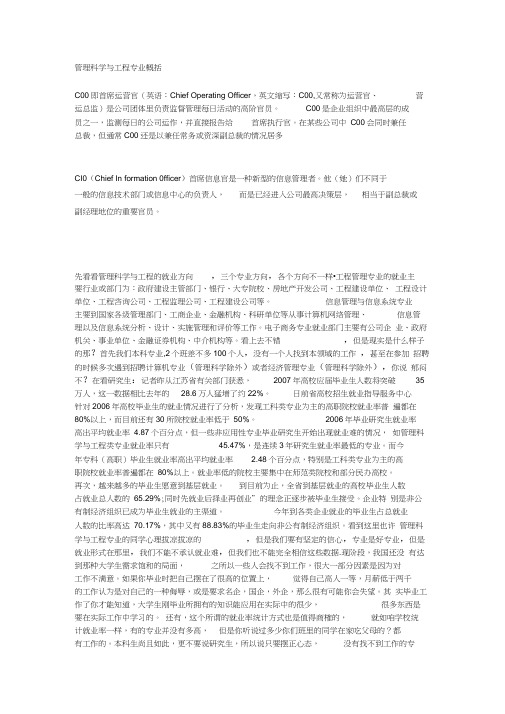
管理科学与工程专业概括C00即首席运营官(英语:Chief Operating Officer,英文缩写:C00,又常称为运营官、营运总监)是公司团体里负责监督管理每日活动的高阶官员。
C00是企业组织中最高层的成员之一,监测每日的公司运作,并直接报告给首席执行官。
在某些公司中C00会同时兼任总裁,但通常C00还是以兼任常务或资深副总裁的情况居多CI0(Chief In formation 0fficer)首席信息官是一种新型的信息管理者。
他(她)们不同于一般的信息技术部门或信息中心的负责人,而是已经进入公司最高决策层,相当于副总裁或副经理地位的重要官员。
先看看管理科学与工程的就业方向,三个专业方向,各个方向不一样•工程管理专业的就业主要行业或部门为:政府建设主管部门、银行、大专院校、房地产开发公司、工程建设单位、工程设计单位、工程咨询公司、工程监理公司、工程建设公司等。
信息管理与信息系统专业主要到国家各级管理部门、工商企业、金融机构、科研单位等从事计算机网络管理、信息管理以及信息系统分析、设计、实施管理和评价等工作。
电子商务专业就业部门主要有公司企业、政府机关、事业单位、金融证券机构、中介机构等。
看上去不错,但是现实是什么样子的那?首先我们本科专业,2个班差不多100个人,没有一个人找到本领域的工作,甚至在参加招聘的时候多次遇到招聘计算机专业(管理科学除外)或者经济管理专业(管理科学除外),你说郁闷不?在看研究生:记者昨从江苏省有关部门获悉,2007年高校应届毕业生人数将突破35万人,这一数据相比去年的28.6万人猛增了约22%。
日前省高校招生就业指导服务中心针对2006年高校毕业生的就业情况进行了分析,发现工科类专业为主的高职院校就业率普遍都在80%以上,而目前还有30所院校就业率低于50%。
2006年毕业研究生就业率高出平均就业率 4.87个百分点,但一些非应用性专业毕业研究生开始出现就业难的情况,如管理科学与工程类专业就业率只有45.47%,是连续3年研究生就业率最低的专业。
《公共管理专业英语》Unit4 textB翻译

Recent Transformations Administration Theory:a revolution in public management?近代的变革管理理论:公共管理的改革Since the early1980s much work has been conducted in public administration theory and practice that claims to go beyond the conservative approach in the field.This “liberalization” of public administration is recognized today as the NPM trend.The self-identity problem of public administration was greatly aggravated by the launching of the idea of NPM.As noted by Kettl and Mitward,“public management is neithe r traditional public administration nor policy analysis since it borrows heavily from a variety of disciplines and methodological approaches.”Mainly drawing on the experience of the business/industrial/private sector,scholars have suggested taking a more demanding attitude to the dynamics,activity,and productivity of public organizations:however,“competing academic disciplines dueled to establish bridgeheads or,worse,virtually ignored each other as they developed parallel tracks on related problems”.Consequently,a cross-fertilization,which could have accelerated learning and improved performance of public systems,was delayed.自20世纪80年代初以来,很多工作都已经在公共行政理论和实践中开展,主张要超越公共行政领域的保守研究方法。
工商管理专业英语课程教学大纲
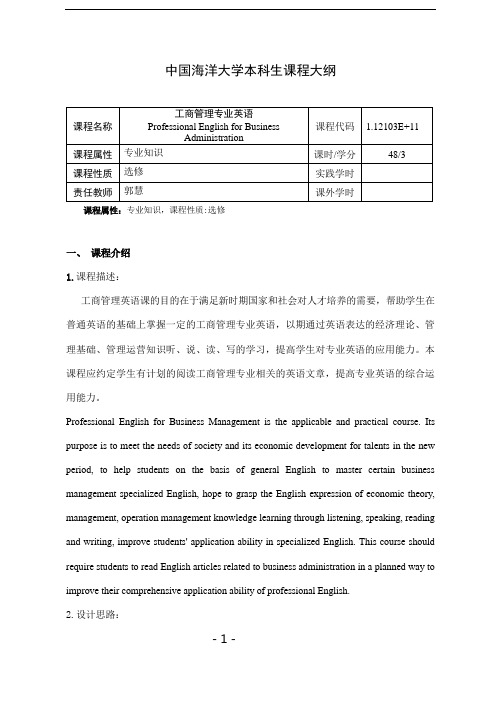
中国海洋大学本科生课程大纲课程属性:专业知识,课程性质:选修一、课程介绍1.课程描述:工商管理英语课的目的在于满足新时期国家和社会对人才培养的需要,帮助学生在普通英语的基础上掌握一定的工商管理专业英语,以期通过英语表达的经济理论、管理基础、管理运营知识听、说、读、写的学习,提高学生对专业英语的应用能力。
本课程应约定学生有计划的阅读工商管理专业相关的英语文章,提高专业英语的综合运用能力。
Professional English for Business Management is the applicable and practical course. Its purpose is to meet the needs of society and its economic development for talents in the new period, to help students on the basis of general English to master certain business management specialized English, hope to grasp the English expression of economic theory, management, operation management knowledge learning through listening, speaking, reading and writing, improve students' application ability in specialized English. This course should require students to read English articles related to business administration in a planned way to improve their comprehensive application ability of professional English.2.设计思路:- 1 -本课程引导工商管理专业高年级学生通过一些专业知识的回顾学习掌握工商管理专业英语在听、说、读、写方面的运用。
工商管理专业英语Unit1-3课件

Management science approach Focuses on the task of production and operations, uses of mathematical and statistic techniques to build models for the solution of production and operations problems.
nonroutine /nɔnru:'ti:n/ analogue ['æ nəlɒg+
Translation 1.当然,富有远见并不是成功的保证。
2.通常,一份任务报告书的目标总是聚焦于该 企业所服务的市场和顾客群。
3.这些管理人员都是能制定计划并引导企业朝 目标前进的战略家。
4.与其他人的沟通、和他们一起高效率地工作、 激励他们、领导他们,这些都是在人际关系 方面所需要的能力。
2.该领域的研究能使作为组织成员的个人更好 地理解自己的、同事的、上司的及下属的组 织行为。
The study of the field should enable you as an organizational member to better understand your own organizational behavior, as well as that of your peers, superiors, and subordinates.
English for Bu
Learning Objectives:
●This course is designed to help the students of Business Administration improve the professional English reading comprehension and the ability to use English for business communication and negotiation. (提高专业 英语阅读理解水平以及运用能力)
控制科学与工程专业英语词汇
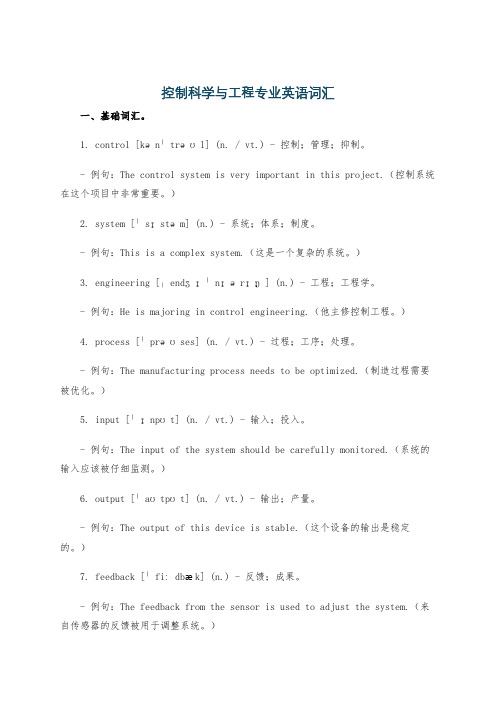
控制科学与工程专业英语词汇一、基础词汇。
1. control [kənˈtrəʊl] (n. / vt.) - 控制;管理;抑制。
- 例句:The control system is very important in this project.(控制系统在这个项目中非常重要。
)2. system [ˈsɪstəm] (n.) - 系统;体系;制度。
- 例句:This is a complex system.(这是一个复杂的系统。
)3. engineering [ˌendʒɪˈnɪərɪŋ] (n.) - 工程;工程学。
- 例句:He is majoring in control engineering.(他主修控制工程。
)4. process [ˈprəʊses] (n. / vt.) - 过程;工序;处理。
- 例句:The manufacturing process needs to be optimized.(制造过程需要被优化。
)5. input [ˈɪnpʊt] (n. / vt.) - 输入;投入。
- 例句:The input of the system should be carefully monitored.(系统的输入应该被仔细监测。
)6. output [ˈaʊtpʊt] (n. / vt.) - 输出;产量。
- 例句:The output of this device is stable.(这个设备的输出是稳定的。
)7. feedback [ˈfiːdbæk] (n.) - 反馈;成果。
- 例句:The feedback from the sensor is used to adjust the system.(来自传感器的反馈被用于调整系统。
)8. parameter [pəˈræmɪtə(r)] (n.) - 参数;系数。
- 例句:We need to adjust the parameters of the model.(我们需要调整模型的参数。
各专业课程英文翻译精品

各专业课程英文翻译(精心整理)生物及医学专业课程汉英对照表应用生物学Applied Biology医学技术Medical Technology细胞生物学Cell Biology医学Medicine生物学Biology护理麻醉学Nurse Anesthesia进化生物学Evolutionary Biology口腔外科学Oral Surgery海洋生物学Marine Biology口腔/牙科科学Oral/Dental Sciences微生物学Microbiology骨科医学Osteopathic Medicine分子生物学Molecular Biology耳科学Otology医学微生物学Medical Microbiology理疗学Physical Therapy口腔生物学Oral Biology足病医学Podiatric Medicine寄生物学Parasutology眼科学Ophthalmology植物生物学Plant Physiology预防医学Preventive Medicine心理生物学Psychobiology放射学Radiology放射生物学Radiation Biology康复咨询学Rehabilitation Counseling理论生物学Theoretical Biology康复护理学Rehabilitation Nursing 野生生物学Wildlife Biology外科护理学Surgical Nursing环境生物学Environmental Biology治疗学Therapeutics运动生物学Exercise Physiology畸形学Teratology有机体生物学Organismal Biology兽医学Veterinary Sciences生物统计学Biometrics牙科卫生学Dental Sciences生物物理学Biophysics牙科科学Dentistry生物心理学Biopsychology皮肤学Dermatology生物统计学Biostatistics内分泌学Endocrinology生物工艺学Biotechnology遗传学Genetics生物化学Biological Chemistry 解剖学Anatomy生物工程学Biological Engineering麻醉学Anesthesia生物数学Biomathematics临床科学Clinical Science生物医学科学Biomedical Science临床心理学Clinical Psychology细胞生物学和分子生物学Celluar and Molecular Biology精神病护理学Psychiatric Nursing力学专业数学分析Mathematical Analysis高等代数与几何Advanced Algebra and Geometry常微分方程Ordinary Differential Equation数学物理方法Methods in Mathematical Physics计算方法Numerical Methods理论力学Theoretical Mechanics材料力学Mechanics of Materials弹性力学Elasticity流体力学Fluid Mechanics力学实验Experiments in Solid Mechanics 机械制图Machining Drawing力学概论Introduction to Mechanics气体力学Gas Dynamics计算流体力学Computational Fluid Mechanics弹性板理论Theory of Elastic Plates粘性流体力学Viscous Fluid Flow弹性力学变分原理Variational Principles inElasticity有限元法Finite Element Method塑性力学Introduction of Plasticity经典力学中的数学方法Mathematical Methods of ClassicalMechanics机器人动力学Dynamics of Robots自动控制原理Principles of Automatic Control优化计算与最化控制Optimization and OptimalControl计算机图形学Computer Graphics概率与统计Probability and Statistics 专业英语English for Mechanics振动理论Theory of Vibration程序设计方法(C和FORTRAN)Programming in C&FORTRAN水动力学Hydrodynamics计算机图象处理Image Processing光测力学Photo Mechanics断裂力学Fracture Mechanics高等动力学Advanced Dynamics摄动方法Perturbation Methods机械设计与Auto CAD Machinery Designing and AutoCAD信息显示(可视化)Visualization微机原理Principles of Personal Computer复变函数Complex Function企业管理专业管理学Principles of Management微观经济学Microeconomics宏观经济学Macroeconomics管理信息系统Systems of Management Information产业经济学Industrial Economics财务管理Financial Management项目评估Projects Appraisal战略管理Strategic Management管理沟通Management Negotiation国际商务谈判Negotiation on Business Affairs跨国公司专题研究Special Researchof multinational corporation国际贸易InternationalTrade国际营销研究International Marketing Research公司组织与管理Organization and Managementof Corporate战略管理Strategic Management生产管理研究Operation Management企业伦理Enterprise Ethics组织行为学Organizational Behavior运筹学Operational Research人力资源管理Human Resource Management 信息管理专业高等数学Higher Mathematics信息存储与检索Information Retrieval andStorage数据库系统Database信息服务与用户information Service and UserStudy信息管理概论Introduction to InformationManagement信息经济学Information Economics 企业信息化工程Enterprise Informationalization社会实践Practical Work信息分析与决策Information Analysis andPolicy Making管理学原理Principles of Management信息政策与法规Information Policy and Law 信息组织Information Organization计算机网络Computer Networks管理信息系统Management Information System线性代数Linear Algebra决策分析Policy Making离散数学Discrete Mathematics概率统计Statistics and ProbabilityTheory生产与运作管理Production Management电子商务Electronic Commerce信息系统安全与保密Information System Security政府信息化工程Government Informationalization广告实务Practice of Advertisement多媒体技术Multimedia操作系统Operating System信息科学基础Foundations of InformationScience经济信息管理Economic Information Management专业英语Specialty English微机基础Principles of Microcomputers 文献计量学Bibliometrics电子出版技术Electronic Publishing广告概论Introduction to Advertisement信息环境论Information Environments传播学原理Principles of CommunicationTheory知识产权法学Law of Intelligence Property组织行为学Studies of Organization 货币银行学专业货币银行学Money and Banking管理信息系统System of Management Information宏观经济学Macroeconomics运筹学Operational Research策略管理Strategic Management保险学Insurance银行会计Bank Accounting管理会计Managerial Accounting运筹学Operational Research国际贸易International Trade财务管理Financial Management国际金融International Finance租赁与信托Hiring and Affiancing证券投资学Security Analysis and Investment商业银行实务Practice of Business Bank国际结算International Balance项目评估Projects Appraisal金融市场学Financial Marketing人力资源管理Human Resource Management财务报告分析Analysis of Financial Statement财务案例分析Case Analysis of FinancialManagement物理专业热学Thermodynamics力学Mechanics光学Optics电磁学Electromagnetism计算概论Computing Generality普通物理实验General Physics Laboratory 固体磁性及应用基础Magnetism of the Solid Stateand its Application衍射物理(固体结构分析)Diffraction Physics(Structureof Solid Analysis)科研实用软件Utility Software for ScientificResearch计算机模拟方法Computer Simulation Methods激光原理、技术与应用The Principle,Techniqueand Application of Laser材料物理Materials Physics近代光学和光电子学Modern Optics and Optoelectronics现代固体物理Modern Solid State Physics粒子物理Particle Physics物理宇宙学基础Elements of Cosmology Physics固体物理Solid State Physics原子物理Atomic Physics量子力学Quantum Mechanics理论力学Theoretical Mechanics电动力学Electrodynamics普通物理综合实验Synthetical Experiments ofGeneral Physics市场营销学专业营销管理Marketing Management公共关系Public Relationship国际贸易International Trade消费者行为Consumer Behavior管理信息系统Systems of Management Information营销调研Marketing Research 推销学Sales Strategies国际金融International Finance营销预测与规划Marketing Forecasting andPlanning销售渠道管理ales Channels Management 管理学Principles of Management国际市场营销International Marketing商业谈判Business Negotiation广告管理Advertising Management营销案例分析Case Studies of Marketing国际贸易实务Practice of InternationalTrade服务业营销Service Industry Marketing企业伦理Enterprise Ethics新产品开发New Products Development财务学专业货币银行学Money and Banking证券投资学Security Analysis and Investment财务报告分析Analysis of Financial Statement国际金融International Finance保险学Insurance财务案例分析Case Analysis of FinanceManagement国际财务管理International Financial Management资产评估Assets Appraisal项目评估Projects Appraisal宏观经济学Macroeconomics财务管理Financial Management管理信息系统Systems of Management Information运筹学Operational Research策略管理Strategic Management管理会计Managerial Accounting微观经济学Microeconomics管理学Principles of Management微积分Calculus统计学Principles of Statistics会计专业会计学Accounting Principles成本会计Cost Accounting管理会计Managerial Accounting审计学Auditing Principles 会计信息系统Accounting Information Systems投资学Investment Principles财务管理Financial Management货币银行学Money and Banking 财务报告分析Analysis of Financial Statement国际金融International Finance国际会计International Accounting统计学Principle of Stat 财税法规与税务会计Laws and Regulations of Financeand Taxes预算会计Budget Accounting会计研究方法Accounting Research Methods内部审计与政府审计Internal Auditing and GovernmentAuditing会计审计实务Accounting and Auditing Practice经济计量学Economic Metrology会计职业道德与责任Accounting Ethics and Responsibilities国际会计专题International AccountingSpecial Subject微观经济学Microeconomics欢迎您的下载,资料仅供参考!致力为企业和个人提供合同协议,策划案计划书,学习资料等等打造全网一站式需求。
技术经济管理与管理科学与工程专业

技术经济管理与管理科学与工程专业技术经济与管理专业主修课程:第一外国语科学社会主义理论与实践自然辩证法应用数学基础计算机应用基础第二外国语应用统计方法管理学技术经济学运筹学II经济学以下为选修课程:计量经济学工程计价学项目管理学生产与运作管理技术经济学n风险管理与保险博弈论与信息经济学投资学管理创新多目标决策与评价技术制度经济学市场营销学管理研究方法战略管理项目过程控制就业方向:可胜任本专业或相邻专业的教学、科研和实际的投资管理、项目管理以及相关的造价管理工作。
主要研究方向:1、投资决策与工程造价管理主要研究政府投资项目及一般业主投资项目的投资决策工程造价计价与支付公共工程项目投资与运营模式公共项目的建设管理模式及监管等内容。
2、工程经济与项目管理主要研究投资项目的决策理论投资项目的管理体系项目管理知识体系项目管理在一般制造业中的应用全寿命工程项目管理理论等内容。
3、风险分析与工程保险主要研究工程项目的风险管理及工程保险的基本理论及方法工程保险的制度安排公共安全及预警机制等内容。
4、企业创新与运作重构本方向围绕企业技术经济运作以企业形态、重组、技术创新和低成本运作等方面为主要研究内容。
紧密联系企业实际形成以下三个方面的研究优势:(1)企业存在形式的演变包括企业新形态的产生企业的边界企业的消退企业的重组;(2)企业制度创新包括企业治理结构和内、外部机制管理制度化与程序化的均衡与突破;(3)企业技术创新和运作创新包括 R&;D运作、资产运作和物流等运作的创新。
排名学校名称等级排名学校名称等级排名学校名称等级1重庆大学9上海交通大学A17哈尔滨理工大学A2活华大学A+10河海大学A18厦门大学A3中山大学A+11东北财经大学A中南大学A4华中科技大学]A+12浙江大学A20南开大学A5吉林大学A+13哈尔滨工业大学A21河北工业大学A6大连理工大学A+14武汉理工大学A22中国人民大学A7天津人学_ A15武汉大学A23西安交通大学A8华北电力大学]A16同济大学A24西南财经大学AB+等(38个):复旦大学、北京交通大学、东南大学、浙江工业大学、福州大学、上海财经大学、暨南大学、北京化工大学、北京邮电大学、湖南大学、西北工业大学、长安大学、重庆交通大学、四川大学、对外经济贸易大学、辽宁工程技术大学、南京工业大学、西安理工大学、西安建筑科技大学、北京理工大学、东北电力大学、西南交通大学、华南理工大学、中国石油大学、南京农业大学、中北大学、山东科技大学、安徽大学、山东大学、山西财经大学、大庆石油学院、中国矿业大学、山东经济学院、中国海洋大学、北京科技大学、四川农业大学、西安电子科技大学、天津理工大学B等(37个):南京航空航天大学、山东建筑大学、安徽工业大学、上海海事大学、西北大学、中央民族大学、天津商业大学、郑州大学、安徽农业大学、三峡大学、浙江工商大学、河南财经学院、北京航空航天大学、青岛科技大学、中南财经政法大学、华侨大学、济南大学、电子科技大学、广东工业大学、江苏大学、长沙理工大学、新疆大学、山东财政学院、哈尔滨商业大学、西安科技大学、天津财经大学、哈尔滨工程大学、内蒙古工业大学、北京建筑工程学院、北京信息科技大学、河北经贸大学、西安石油大学、昆明理工大学、上海理工大学、河南理工大学、内蒙古农业大学、西南石油大学哈尔滨工程大学院系代码、名称、专业代码、名称及研究方向招生人数(预计接收推免生人数)初试科目复式笔试科目同等学历加试科目120214技术经济及管理 01会计与财务管理理论与方法02技术经济与项目管理10(3)思想政治理论201英语一或202俄语或203日语303数学三819管理学企业战略管理技术经济学二门任选其一企业战略管理技术经济学120__0管理科学与工程01管理系统工程02信息管理与信息系统03工业工程与管理工程04危机响应与管理05船舶工业管理20(7)思想政治理论201英语一或202俄语或203日语303数学三819管理学运筹学运筹学计量经济学管理科学与工程排名学校名称等级排名学校名称等级排名学校名称等级1北京航空航天大学A+11同济大学A21北京邮电大学A2清华大学A+12复旦大学A22湖南大学A3上海交通大学A+13北京理工大学A23武汉理工大学A4西安交通大学A+14东北大学A24北京工业大学5天津大学A+15重庆大学A25南京大学A6哈尔滨工业大学A+16西北工业大学A26中南大学A7大连理工大学A+东南大学A27电子科技大学A8华中科技大学A18武汉大学A28河海大学A9浙江大学A19西南交通大学A10中国科学技术大学A20哈尔滨工程大学A管理科学与工程专业排行榜重点优势学科单位:1清华大学2北京航空航天大学 3上海交通大学4天津大学5西安交通大学6哈尔滨工业大学 7大连理工大学优势学科单位:1浙江大学2华中科技大学3合肥工业大学4北京理工大学5重庆大箜6复旦大学7中南大学8东北大学9东南大学10中国科学技术大学11电子科技大学12西南交通大学13西北工业大学14哈尔滨工程大学15河海大学16北京邮电大学17 武汉大学18 南京航空航天大学 19 同济大学20 四川大学21 武汉理工大学22南京大学Tips :1、清华大学:中国高校研究生教育竞争力总排名2(478), 市内排名第2 ( 48 ),理工类排名1 ( 154 );研招办:0102、北京航空航天大学:中国高校研究生教育竞争力总排名21(478)市内排名5(48 )理工类排名第 8 ( 154 );研招办:0103、上海交通大学:中国高校研究生教育竞争力总排名5(478)市内排名2 ( 21 ),理工类排名第2 ( 154 );研招办:0214、天津大学:中国高校研究生教育竞争力总排名27(478)市内排名第2 ( 18 );理工类排名第12 ( 154 )研招办:0225、西安交通大学:中国高校研究生教育竞争力总排名19(478)省内排名第1 ( 24 ),理工类排名第7 ( 154 );研招办:0296、哈尔滨工业大学:中国高校研究生教育竞争力总排名14(478) 省内排名第1(17 )理工类排名第 5 ( 154 );研招办:04517、大连理工大学:中国高校研究生教育竞争力总排名25(478)省内排名第1 ( 33 ),理工类排名第11 ( 154 );国务院确定多项金融财税政策支持小企业发展20__年10月12日17:49中国政府网我要评论(12) 字号:T|T温家宝主持召开国务院常务会议研究确定支持小型和微型企业发展的金融财税政策措施国务院总理温家宝12日主持召开国务院常务会议研究确定支持小型和微型企业发展的金融、财税政策措施。
公共管理专业英语词汇

《公共管理专业英语》教学大纲李环编写公共事业管理专业课程教学大纲1824 目录前言 (1825)第一章State Formation and Social Policy in the United States (1826)本章生词 (1826)本章专业词汇 (1827)本章阅读需回答的问题 (1828)参考书目 (1828)第二章America’s First Social Security System: the Expansion of Benefits for Civil War Veteran (1829)本章所要掌握英语词汇 (1829)本章所要掌握专业词汇 (1830)本章阅读所要回答的问题 (1830)本章参考数目 (1831)第三章“Brother Can You Spare a Job?” Work and Welfare in the United States (1832)本章所需掌握词汇 (1832)本章所需掌握专业词汇 (1833)本章阅读所需回答问题 (1834)本章参考数目 (1835)第四章 Targeting within Universalism: Politically viable policies to combat poverty in the United States (1836)本章词汇 (1836)本章专业词汇 (1837)本章需要回答的问题 (1838)本章参考书目 (1838)第五章Gender and the Origins of Modern Social Policies in Britain and the United States (1839)Questions to answer (1840)本章参考书目 (1841)公共管理专业英语前言课程性质:本课程是针对具有一定的公共管理专业知识,同时具备一定的英语水平(四级以上)的学生而开设的。
新版中南大学管理科学与工程专业考研经验考研参考书考研真题

考研是我一直都有的想法,从上大学第一天开始就更加坚定了我的这个决定。
我是从大三寒假学习开始备考的。
当时也在网上看了很多经验贴,可是也许是学习方法的问题,自己的学习效率一直不高,后来学姐告诉我要给自己制定完善的复习计划,并且按照计划复习。
于是回到学校以后,制定了第一轮复习计划,那个时候已经是5月了。
开始基础复习的时候,是在网上找了一下教程视频,然后跟着教材进行学习,先是对基础知识进行了了解,在5月-7月的时候在基础上加深了理解,对于第二轮的复习,自己还根据课本讲义画了知识构架图,是自己更能一目了然的掌握知识点。
8月一直到临近考试的时候,开始认真的刷真题,并且对那些自己不熟悉的知识点反复的加深印象,这也是一个自我提升的过程。
其实很庆幸自己坚持了下来,身边还是有一些朋友没有走到最后,做了自己的逃兵,所以希望每个人都坚持自己的梦想。
本文字数有点长,希望大家耐心看完。
文章结尾有我当时整理的详细资料,可自行下载,大家请看到最后。
中南大学管理科学与工程专业初试科目:101 思想政治理论201英语一303数学三966运筹学(B)考试大纲:参考书目:《运筹学》运筹学编写组,清华大学出版社,1990年版;《运筹学》徐选华主编,第二版,2007年3月,湖南人民出版社关于英语复习的建议考研英语复习建议:一定要多做真题,通过对真题的讲解和练习,在不断做题的过程中,对相关知识进行查漏补缺。
对于自己不熟练的题型,加强训练,总结做题技巧,达到准确快速解题的目的。
虽然准备的时间早但因为各种事情耽误了很长时间,真正复习是从暑假开始的,暑假学习时间充分,是复习备考的黄金期,一定要充分利用,必须集中学习,要攻克阅读,完形,翻译,新题型!大家一定要在这个时间段猛搞学习。
在这一阶段的英语复习需要背单词,做阅读(每篇阅读最多不超过20分钟),并且要做到超精读。
无论你单词背的多么熟,依然要继续背单词,不能停。
真题是木糖英语的真题手译,把阅读真题争取做三遍,做到没有一个词不认识,没有一个句子不懂,能理解文章的主旨,每道题目选项分析透彻。
管理工程与科学专业的英语合成词
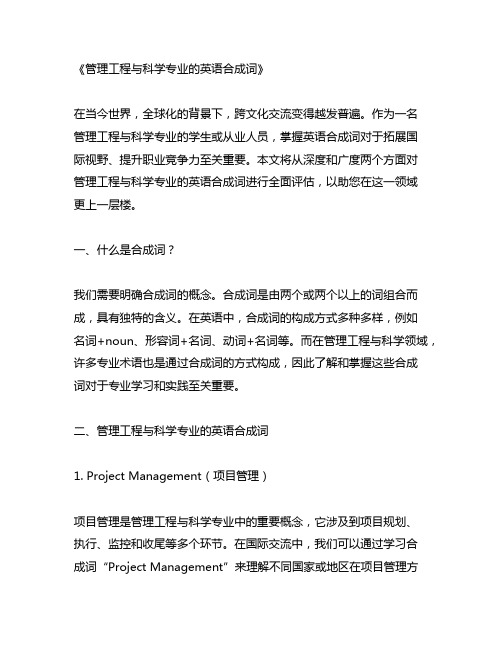
《管理工程与科学专业的英语合成词》在当今世界,全球化的背景下,跨文化交流变得越发普遍。
作为一名管理工程与科学专业的学生或从业人员,掌握英语合成词对于拓展国际视野、提升职业竞争力至关重要。
本文将从深度和广度两个方面对管理工程与科学专业的英语合成词进行全面评估,以助您在这一领域更上一层楼。
一、什么是合成词?我们需要明确合成词的概念。
合成词是由两个或两个以上的词组合而成,具有独特的含义。
在英语中,合成词的构成方式多种多样,例如名词+noun、形容词+名词、动词+名词等。
而在管理工程与科学领域,许多专业术语也是通过合成词的方式构成,因此了解和掌握这些合成词对于专业学习和实践至关重要。
二、管理工程与科学专业的英语合成词1. Project Management(项目管理)项目管理是管理工程与科学专业中的重要概念,它涉及到项目规划、执行、监控和收尾等多个环节。
在国际交流中,我们可以通过学习合成词“Project Management”来理解不同国家或地区在项目管理方面的经验和智慧,拓展自己的视野。
2. Data Analysis(数据分析)数据分析在科学领域中占据着重要地位,它涉及到大量的统计学知识和计算机技术。
而学习英语合成词“Data Analysis”则可以帮助我们更好地理解国外学者对于数据分析的理解和运用。
3. Risk Assessment(风险评估)在管理工程中,风险评估是必不可少的环节,它涉及到对项目或计划可能面临的各种风险进行评估和规避。
掌握英语合成词“Risk Assess ment”有助于我们了解国外在风险评估方面的研究和实践成果,从而为自己的工作提供更好的参考。
4. Quality Control(质量控制)质量控制是管理工程与科学领域中的核心内容之一,它涉及到生产过程中的各种质量监控和管理工作。
学习英语合成词“Quality Control”可以让我们更好地理解国外企业在质量管理方面的先进经验,启发我们提升质量管理水平。
2024管理科学与工程培养方案
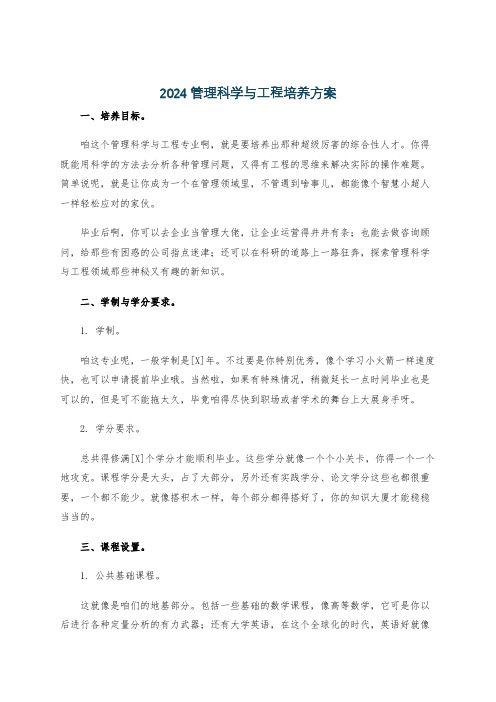
2024管理科学与工程培养方案一、培养目标。
咱这个管理科学与工程专业啊,就是要培养出那种超级厉害的综合性人才。
你得既能用科学的方法去分析各种管理问题,又得有工程的思维来解决实际的操作难题。
简单说呢,就是让你成为一个在管理领域里,不管遇到啥事儿,都能像个智慧小超人一样轻松应对的家伙。
毕业后啊,你可以去企业当管理大佬,让企业运营得井井有条;也能去做咨询顾问,给那些有困惑的公司指点迷津;还可以在科研的道路上一路狂奔,探索管理科学与工程领域那些神秘又有趣的新知识。
二、学制与学分要求。
1. 学制。
咱这专业呢,一般学制是[X]年。
不过要是你特别优秀,像个学习小火箭一样速度快,也可以申请提前毕业哦。
当然啦,如果有特殊情况,稍微延长一点时间毕业也是可以的,但是可不能拖太久,毕竟咱得尽快到职场或者学术的舞台上大展身手呀。
2. 学分要求。
总共得修满[X]个学分才能顺利毕业。
这些学分就像一个个小关卡,你得一个一个地攻克。
课程学分是大头,占了大部分,另外还有实践学分、论文学分这些也都很重要,一个都不能少。
就像搭积木一样,每个部分都得搭好了,你的知识大厦才能稳稳当当的。
三、课程设置。
1. 公共基础课程。
这就像是咱们的地基部分。
包括一些基础的数学课程,像高等数学,它可是你以后进行各种定量分析的有力武器;还有大学英语,在这个全球化的时代,英语好就像多了一双眼睛,可以看到更多的国际管理经验和知识;再有就是思想政治类的课程啦,让你在成长为管理人才的道路上有正确的价值观和思想导向。
2. 专业基础课程。
这是咱们专业的根基中的根基。
像管理学原理,这门课就像一本管理秘籍,告诉你管理到底是怎么一回事儿,从计划、组织到领导、控制,每个环节都有讲究;运筹学也很重要,它能教你如何在各种复杂的情况下,找到最优的解决方案,就像一个聪明的军师一样;系统工程概论呢,让你从整体的角度看待问题,明白各个部分之间是怎么相互关联、相互影响的。
3. 专业核心课程。
工商管理专业双语教学的实施与分析
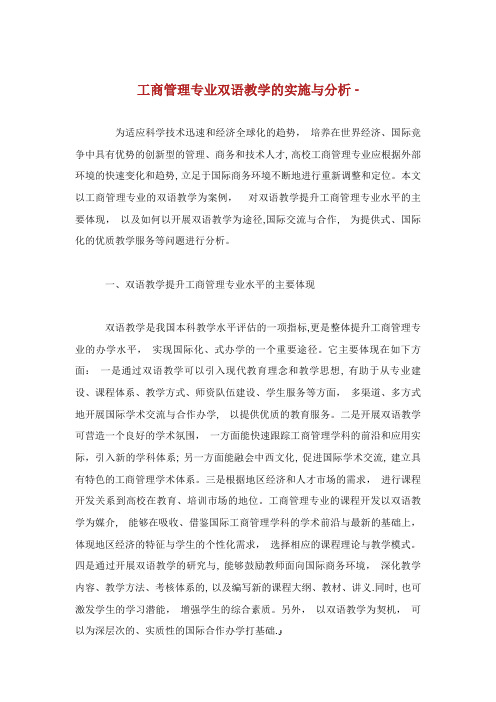
工商管理专业双语教学的实施与分析 -为适应科学技术迅速和经济全球化的趋势,培养在世界经济、国际竞争中具有优势的创新型的管理、商务和技术人才, 高校工商管理专业应根据外部环境的快速变化和趋势, 立足于国际商务环境不断地进行重新调整和定位。
本文以工商管理专业的双语教学为案例,对双语教学提升工商管理专业水平的主要体现,以及如何以开展双语教学为途径,国际交流与合作,为提供式、国际化的优质教学服务等问题进行分析。
一、双语教学提升工商管理专业水平的主要体现双语教学是我国本科教学水平评估的一项指标,更是整体提升工商管理专业的办学水平,实现国际化、式办学的一个重要途径。
它主要体现在如下方面:一是通过双语教学可以引入现代教育理念和教学思想, 有助于从专业建设、课程体系、教学方式、师资队伍建设、学生服务等方面,多渠道、多方式地开展国际学术交流与合作办学,以提供优质的教育服务。
二是开展双语教学可营造一个良好的学术氛围,一方面能快速跟踪工商管理学科的前沿和应用实际,引入新的学科体系; 另一方面能融会中西文化, 促进国际学术交流, 建立具有特色的工商管理学术体系。
三是根据地区经济和人才市场的需求,进行课程开发关系到高校在教育、培训市场的地位。
工商管理专业的课程开发以双语教学为媒介,能够在吸收、借鉴国际工商管理学科的学术前沿与最新的基础上,体现地区经济的特征与学生的个性化需求,选择相应的课程理论与教学模式。
四是通过开展双语教学的研究与, 能够鼓励教师面向国际商务环境,深化教学内容、教学方法、考核体系的, 以及编写新的课程大纲、教材、讲义.同时, 也可激发学生的学习潜能,增强学生的综合素质。
另外,以双语教学为契机,可以为深层次的、实质性的国际合作办学打基础.ﻭ二、工商管理本科专业双语教学的我国工商管理硕士( MBA)专业,一般都采用原版教材,并直接引入西方的教学模式与教学方法,使在思维方式、管理理念、商务技巧等方面直接接触管理科学的前沿,培养了一批国际化的高层次工商管理人才.目前, 有些院校直接采用了MBA的教学模式。
- 1、下载文档前请自行甄别文档内容的完整性,平台不提供额外的编辑、内容补充、找答案等附加服务。
- 2、"仅部分预览"的文档,不可在线预览部分如存在完整性等问题,可反馈申请退款(可完整预览的文档不适用该条件!)。
- 3、如文档侵犯您的权益,请联系客服反馈,我们会尽快为您处理(人工客服工作时间:9:00-18:30)。
彼得·德鲁克 n.严谨 perceptual adj.感性的
However, with the shackles of traditional teaching philosophy, there is a serious problem divorced from the teachers’ teaching and student’s learning. Even some teachers only teach student according to the script book, so that many students completely have no interest in class. The due process of integration between teachers and students is easily replaced by that of isolation and confrontation, with exception of some teachers’ organizing disciplined classes which comprise the absence of students’ dominant position and the resultant limited effect. Therefore, how to improve students’ learning and how to use correctly student’s roles in order to achieve teacher-student integration? In our opinion, according to our teaching experience in school and training experience in corporation, it is a effective solution for students to participate in teacher-led class to achieve the desired teaching effectiveness. In this paper, the theoretical foundation and design principles of participatory teaching and learning in management course are discussed, which provide some inspiration for majority of teachers in management as well as other categories of curriculum teaching in the use of participatory teaching idea and method to improve teaching effect.
Principles of Participatory Teaching Methods on Management Science
管理科学中参与式教学方法的原则
I. INTRODUCTION
Management science is a necessary course opened for majors in many of our institutions of higher learning.It can be interpreted by the practical implication for the importance of the teaching position on management. As Peter Drucker,the famous American management expert,put it,"In human history, very few of what more rapidly than the emergence and development of the management,has a more significant and more tense impact on humankind."Because it is both a science and an art, to master management is not easy. There is a certain degree of difficulty for teaching activities of management. On the one hand, it comes from scientific rigor and artistic performance of “It can be felt but not explained” in the arena of management. On the other hand, it lies in the freshmen to whom the course be teached. With few managerial recognizations both in rational and perceptual perspectives, our freshmen often fail to achieve the teaching goal named “both to give fish and to give fishing”, that is ,grasp both the managerial theory and practice. As such, it is necessary for teachers to combine closely the characteristics of the course and characteristics of students, to explore and sum up constantly the teaching mode of management course in order to improve its teaching quality .
all-round adj. 全面的;多方面的 doctrine n.主义
Such methods strive to enhance students quality rather than volume, to promote students’ self consciousness and inner wisdom. On benefit of students, there are active learning attitude, good psychological quality influenced by process of acquiring basic knowledge and basic skills, correct choice of value, a sense of social responsibility, and finally the goal of learning how to learn, how to survive and how to make all-round developed. Undoubtedly, as the practice of promoting the comprehensive self-construction, classroom teaching is bound to concern the principal to participate in classroom teaching mode, to concern the comprehensive developed of the individual quality. B. Full participation As early as the time of Confucius, the education is to promote the educational activities for all students, that is anyone should get an education and there is no un-teachable students but unsuitable teachers. The teacher will not teach mainly because they do not understand enough the plasticity of the student and are lack of forceful guidance. To this end, educators advocate teachers for all students to take different ways to be guided, so that their endowment and potential can be comprehensively developed.
